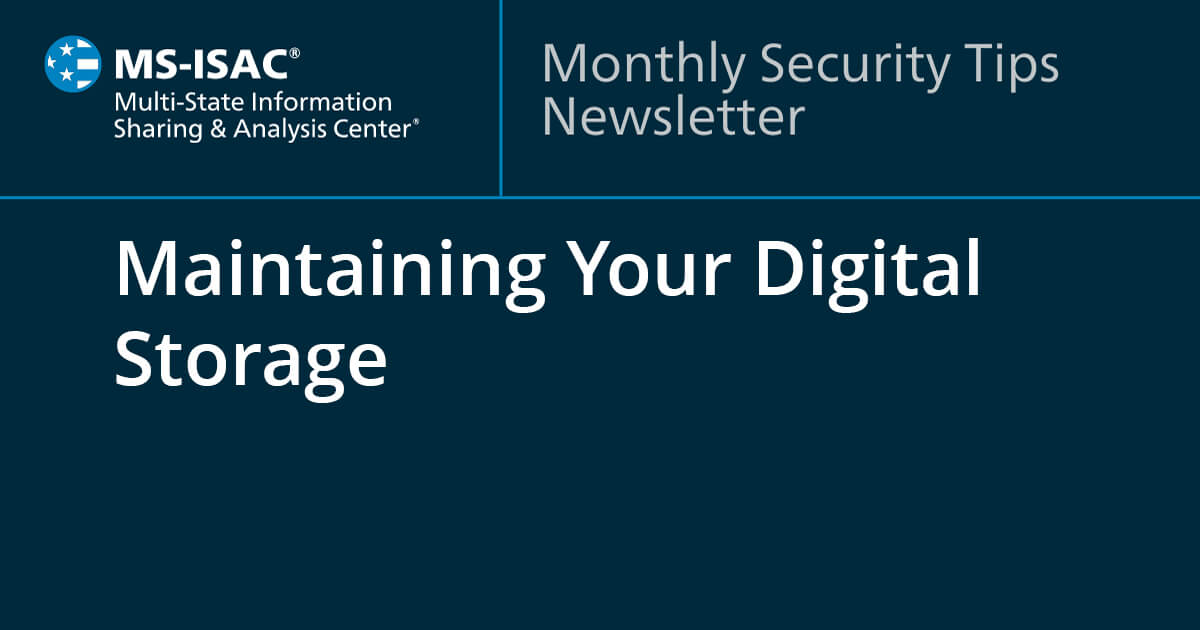August 6, 2019 •Multi-State Information Sharing & Analysis Center

Over the years, we've accumulated a mountain of CDs, hard drives, devices, online accounts, and other mediums that store information. It's a good idea to periodically assess and dispose of unneeded storage media and information. Today, information may be split between physical items you have in your possession, and online accounts or cloud-based storage. (Does anyone else have a collection of floppy disks they've not been able to read for years?) This article will provide some details on how to manage your information and data, as well as how to safely dispose of pieces you no longer need.
Clean your social media presence: It may have been years since you logged into an old social media platform that you no longer use. If that’s the case, consider removing any personally identifiable information like address, date of birth, and other less sensitive details from the account. Furthermore, consider closing the account entirely if you don’t think you’ll have reason to use it anymore. The fewer places you have personal information stored online, the better!
Keep your social media presence clean: Minimize the amount of personal information on social media accounts you still use. In particular, minimize how visible your information is to unknown individuals. Most sites offer this as a privacy option in the settings for your account.
Close old shopping and rewards accounts: If you don't plan on shopping on a particular site, consider closing the account and removing any payment or personal information from the site. If you rarely shop on a web site, consider if it’s necessary to maintain a user account. Most retail sites have a guest account option for temporary use and lessens the likelihood of your information being saved.
Cloud storage and files: Many of us use cloud storage services of some sort, whether it's to store photos or back up and storage of data files. Consider clearing out data and information from these storage accounts periodically that you will not need access to in the future.
CDs, DVDs, Floppy Disks, and other plastic disk media: CDs and DVDs can be shredded in many household paper shredders (check to see if your shredder is rated for this). After validating if you need the information or not, consider this best and irreversible method for destroying the unneeded information and the medium. Floppy disks can be destroyed by splitting open the plastic casing, removing the soft disk itself, popping out the metal hub, and then feeding the soft disk without that metal center into a household paper shredder.
Hard disk drives, Solid State Drives, and USB flash drives: When you are looking to get rid of an old computer, you should properly clean your data off the device. Ensure you properly move photos, important records, and everything else you want to keep onto a newer device or a disk/thumb drive before you start clearing the data. Next, either physically destroy the drive or perform the proper process of overwriting by using a utility to permanently erase the data. For physical destruction of drives, either utilize a paid service to properly destroy the device, or follow this US-CERT guidance. There are many software utilities available to overwrite or permanently destroy data - one may be included with your operating system. US-CERT provides guidance on some utilities and ways to do this properly.
Smartphones, Tablets, Gaming Consoles, and other devices: Perform a “hard reset” which will bring the device back to factory settings and remove your data securely. Always ensure no accounts are permanently logged in on the device. You can consult the maker of the device when seeking guidance on how to locate this setting or utility for that particular make and model.
Disclaimer: These links are provided because they have information that may be useful. The Center for Internet Security (CIS) does not warrant the accuracy of any information contained in the links and neither endorses nor intends to promote the advertising of the resources listed herein. The opinions and statements contained in such resources are those of the author(s) and do not necessarily represent the opinions of CIS.
The views, information, or opinions expressed in this article are solely those of the author and do not necessarily represent the views of Citizens State Bank and its affiliates, and Citizens State Bank is not responsible for and does not verify the accuracy of any information contained in this article or items hyperlinked within. This is for informational purposes and is no way intended to provide legal advice.